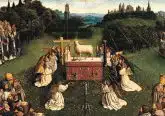The Body and Life According to the Spirit
Note: This article is part of an ongoing series on Pope St. John Paul II’s “Theology of the Body” (TOB).
In his effort to show us the true meaning of “purity of heart,” Pope St. John Paul II meditated on Christ’s words in the gospels before pondering St. Paul’s teaching. St. Paul speaks of life according to the flesh versus life according to the Spirit; however, this opposition in no way implies a condemnation of the body. Indeed, human nature is comprised of the unity of body and soul, both of which are inherently good as created by God.
Nevertheless, we all inherit a human nature that was wounded by sin and through which we experience concupiscence (i.e., disordered desire). Jesus locates the origin of our sinful desires in the human heart (see Mk. 7:21-22). Similarly, when St. Paul speaks about living according to the flesh, he is speaking about using our bodies to gratify the sinful desires that arise in our wounded hearts. Pope St. John Paul II equates this with “secularism,” “sensualism” and living only for that which comes “from the world” (TOB 51:1).
In his letter to the Galatians, St. Paul urges his readers to “not use your freedom as an opportunity for the flesh, but through love be servants of one another” (Gal. 5:13). He further exhorts, “Do not gratify the desires of the flesh for the desires of the flesh are against the Spirit” (Gal. 5:16). He then lists what he calls the “works of the flesh” as “sexual immorality, impurity, sensuality, idolatry, sorcery, enmity, strife, jealousy, fits of anger, rivalries, dissension, divisions, envy, drunkenness, orgies, and the like,” warning “that those who do such things shall not inherit the kingdom of God” (Gal. 5:19-21 ESV). Pope St. John Paul II saw this list as similar to the one Jesus used in Mark 7:21-22, both delineating varieties of sin that occur when we allow concupiscence to direct our actions and our use of the body, ultimately leading to spiritual death.
Instead of submitting our bodies to the disordered desires of our unconverted hearts, Jesus calls us to repent of our sinful ways, accept the gift of redemption and receive the Holy Spirit. As the fathers of the Second Vatican Council beautifully summarized, it is through the gift of the Spirit that our hearts can be renewed:
“The Christian man, conformed to the likeness of that Son Who is the firstborn of many brothers, received ‘the first-fruits of the Spirit’ (Rom. 8:23) by which he becomes capable of discharging the new law of love. Through this Spirit, who is ‘the pledge of our inheritance’ (Eph. 1:14), the whole man is renewed from within, even to the achievement of ‘the redemption of the body’ (Rom. 8:23)” (Gaudium et spes, 22.4).
As we grow in our union with Christ and freely align our wills more and more with the promptings of the Holy Spirit, we begin to experience what St. Paul termed life according to the Spirit, which is characterized by the “fruits of the Spirit,” namely “love, joy, peace, patience, kindness, goodness, faithfulness, gentleness, self-control” (Gal. 5:22-23). Pope St. John Paul II saw these fruits of the Spirit as an expression of purity of heart. In his view, purity requires us to say “no” to our sensual desires when they move us toward actions that violate God’s law (e.g., “works of the flesh”).
However, purity also has an important positive dimension for the pope, which he describes using the words of St. Paul: “For this is the will of God, your sanctification: that you abstain from unchastity; that each one of you knows how to keep his own body with holiness and reverence, not as the object of lustful passions” (1 Thess. 4:3-5). For Pope St. John Paul II, the positive dimension of purity is keeping the body with holiness and reverence. This reverence toward the human body is a very important theme in Theology of the Body and will thus be the subject of future reflections.
 Dr. Andrew Sodergren, MTS, PSY.D is a Catholic psychologist and director of psychological services for Ruah Woods. He speaks on the integration of psychology and the Catholic faith. He and his wife, Ellie, have five children.
Dr. Andrew Sodergren, MTS, PSY.D is a Catholic psychologist and director of psychological services for Ruah Woods. He speaks on the integration of psychology and the Catholic faith. He and his wife, Ellie, have five children.
This article appeared in the June 2024 edition of The Catholic Telegraph Magazine. For your complimentary subscription, click here.














